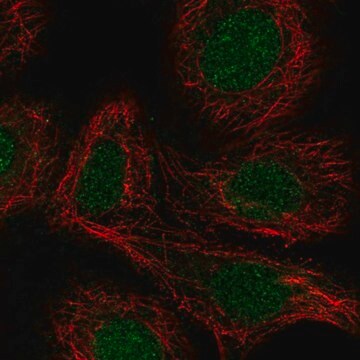推荐产品
product name
LA-N-1, 06041201
生物源
human nerve
增長模式
Semi-adherent aggregates
染色體組型
Modal no. 87, range 47 - 87
形態學
Tear-drop shaped
產品
Catecholamine
受體
Not specified
技術
cell culture | mammalian: suitable
相關疾病
metastasis
運輸包裝
dry ice
儲存溫度
−196°C
細胞系來源
Human Neuroblastoma Bone Marrow Metastasis
細胞系描述
Established by Seeger et al., (1977) from neuroblastoma cells in the bone marrow of a 2-year-old male with clinical Stage IV neuroblastoma. The cells are neuroblastic, tear-drop shaped with multiple short fine cell processes (neurites). The cells are tumourigenic in nude mice. This is a catecholamine producing neuroblastoma cell line.LA-N-1 (Sigma Catalogue number 06041201), LA1-55n (Sigma Catalogue number 06041203) and LA1-5s (Sigma Catalogue number 06041204) have been shown to originate from the same patient by STR profiling.
Established by Seeger et al., (1977) from neuroblastoma cells in the bone marrow of a 2-year-old male with clinical Stage IV neuroblastoma. The cells are neuroblastic, tear-drop shaped with multiple short fine cell processes (neurites). The cells are tumourigenic in nude mice. This is a catecholamine producing neuroblastoma cell line.LA-N-1 (Sigma Catalogue number 06041201), LA1-55n (Sigma Catalogue number 06041203) and LA1-5s (Sigma Catalogue number 06041204) have been shown to originate from the same patient by STR profiling.
DNA分析
STR-PCR Data: Amelogenin: X,Y
CSF1PO: 12
D13S317: 11,12
D16S539: 9
D5S818: 12
D7S820: 10,11
THO1: 8,9.3
TPOX: 8,11
vWA: 16,19
CSF1PO: 12
D13S317: 11,12
D16S539: 9
D5S818: 12
D7S820: 10,11
THO1: 8,9.3
TPOX: 8,11
vWA: 16,19
培養基
EMEM (with non-essential amino acids) and Ham′s F12 (1:1 mixture) + 2mM Glutamine + 10% Foetal Bovine Serum (FBS)
例行更新培養
For routine maintenance, split cultures only after they have become very dense i.e. split once every 2-3 weeks at a 1:20 - 1:100 ratio; 8% CO2; 37°C. Cells grow best and are most adherent on a plastic substrate in medium at a pH of 6.9 - 7.2; they do not tolerate more alkaline pH well. Population doubling time is approximately 2 days; saturation density is >1,000,000 cells/cm2. Cells grow in weakly adherent clusters. Allow all floating clumps to settle and withdraw most of the medium. Remove attached cells from substrate with 0.1% trypsin or PBS alone, cells will detach in <5 minutes. Remaining cells, if any, are large, flat and tightly adherent precursors of Schwann cell/glia/melanocyte lineages. If desired they should be removed from the substrate with trypsin/EDTA. When the neuronal cells are seeded into a new flask the cells attach slowly and may remain in suspension for one to several days; do not change the medium the day after passage. Floating clumps of cells are viable. This passage schedule will select for cells retaining a neuroblastic phenotype; cultures transferred more frequently, with larger inocula, and/or with trypsin/EDTA may gradually lose their neuroblastic properties due to overgrowth by spontaneously arising, non-neuronal adherent cell variants. When cells are resuscitated from a frozen ampoule the cells may appear dead after a day, but reattach and resume growth within 2-3 days reaching confluence by 7 days.
其他說明
Additional freight & handling charges may be applicable for Asia-Pacific shipments. Please check with your local Customer Service representative for more information.
我们的科学家团队拥有各种研究领域经验,包括生命科学、材料科学、化学合成、色谱、分析及许多其他领域.
联系技术服务部门


